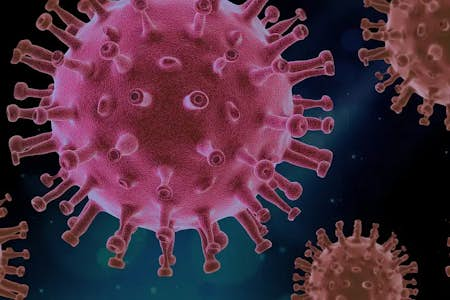Researchers from the University of Glasgow have revealed new data that has left many wondering whether they should catch a cold to help conquer Covid. Scientists have explained that rhinovirus, which causes the common cold, competes with the coronavirus that causes Covid-19 to enter the body's cells. Studies indicate rhinovirus is the more dominant of the two and can prevent coronavirus from entering our cells.
The data suggests that the cold virus could effectively help keep the coronavirus at bay as the dominant virus in our cells. Researchers said that the benefits are short-term ones, but the fact that rhinovirus is so common and widespread means that it could help to suppress the competing virus.
Some viruses do not compete for the dominance of cells. As such, they will allow other viruses also to infect the body's cells. However, the cold virus tends to take over cells and stop other viruses from entering, which means people worried about Covid-19 could benefit from catching a cold.
What the data showed
The last 12 months of social distancing and lockdowns have made it far more difficult for researchers to study this link further. These measures were put in place to minimise the spread of coronavirus. However, they have also helped to prevent the spread of the common cold and flu viruses. As a result, scientists have struggled to do more advanced studies because far fewer people overall are getting any virus.
To study the competition between the two viruses, scientists used a replica airway lining. This was then infected with the two viruses, and the findings analysed.
The data showed that when scientists infected cells with both viruses simultaneously, the cold virus was the only one that achieved success. Likewise, if the rhinovirus infection appeared 24 hours before coronavirus, the latter could not infect the cells. Even where rhinovirus came 24 hours after coronavirus, it was dominant enough to take over.
Only keeping it at bay
Scientists were quick to point out that the cold virus can only keep the coronavirus at bay temporarily. Once the person no longer has a cold and the body's immune response goes back to normal, coronavirus can then affect the cells as the rhinovirus will no longer be present to block its success.
Professor Lawrence Young from the Warwick Medical School said the study indicated "that this common infection could impact the burden of Covid-19 and influence the spread of SarsCoV2, particularly over the autumn and winter months when seasonal colds are more frequent."
It seems the common cold is no longer our enemy and something we should dread getting. Based on this study's data, it could be more of an ally because it helps to keep a more dangerous enemy away, albeit temporarily.






